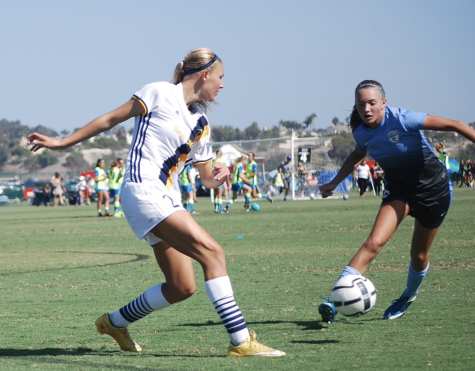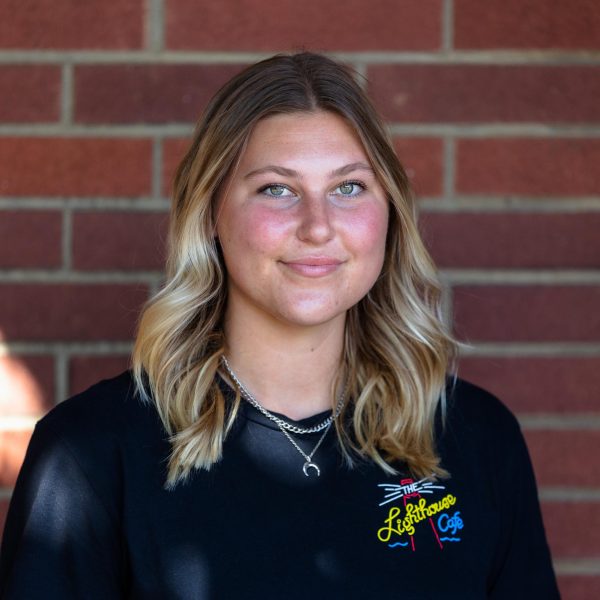Funhouse mirror
How being a former athlete affects the way I see my body
March 10, 2022

“My love handles and tummy stick out in these jeans. My arms have gotten so fat and floppy. I used to be so skinny.”
Thoughts like these invade my mind as I look back at old photos and remember when ‘body image’ was an obscure concept, an insecurity that was unbeknownst to me.
It is painful to reflect on the girl I let go of. It is a kind of grief that isn’t talked about nearly enough — losing an old version of yourself and mourning who you were and who you could have been.
At four years old, my parents signed me up for peewee soccer. At practices, I learned how to kick a ball and score into Pugg pop-up goals.
My dad loved to coach me himself and spent time on the field coming up with drills that would make me a stronger player. He was a student-athlete throughout his high school and college career, playing as forward and center on the basketball team, so sports and fitness had always been a large part of his life. He wanted to use soccer to teach me and my sister commitment and sportsmanship, all so that we could become strong women.
After participating in recreational soccer for six years, I was encouraged by my coach at the time to try out for competitive soccer, a world that was completely foreign to me. I made the second team after a rigorous three-day tryout. I can still remember the acute awareness of my athletic merit when I was accepted. I had been chosen based solely off of my body’s ability.
My identity started to become ingrained in my athletic skill and participation in a competitive sport when I was appointed team captain shortly after the season began.
At twelve years old, I moved up from the second team and onto the first. The transition to a higher level looked like double practices, switching from one uniform to the other and maintaining old friendships while developing new ones.
I played as part of the top team for the next four years of my life. My team traveled to different states for tournaments, competed in regional showcases and practiced constantly. I was required by the club to email college coaches in my freshman year of high school, unsure if that’s even what I wanted.
After realizing that collegiate soccer was not a goal of mine, I quit the club program after my sophomore year of high school.
It is hard to say I was heartbroken because while soccer had been an integral part of my life, its omnipresence kept me from the rest of the world. The time I had spent at practices was now free to be filled by other interests. I was a part of the school musical and led photography club, and the constant anxiety and pressure I felt became something of the past.
However, one of the blessings of involvement in a competitive sport is the level of fitness it requires. Every day I had practice, I could count on leaving fitter than when I arrived. I ran approximately seven to nine miles in every game I played, especially as a center defender who did not get substituted regularly.
So in the final days of my club experience, while ”get on the line” became a central source of anxiety, I also still had my abs, defined legs, lean arms and an overall athletic figure. Once I decided to quit, that inevitably faded.
Although I was still playing high school soccer, through my junior to senior year of high school, I gained forty pounds and developed a hatred for fitness and working out.
My dad began to worry about my health as I steadily declined into stagnation. Our relationship was challenged when his form of showing love through encouraging me to stay active was received by me as his judgment of my new body.
I couldn’t decipher where the line was between my right to rest after all of these years and his right to guide me toward keeping up a healthy lifestyle.
As a sophomore in college, I still struggle with my decision to quit and the idea of who I could have been. I could have been skinnier, leaner, faster, prettier. But here I am as me, with the weight of that decision on my shoulders.
In times where my self-esteem falters and I feel as though the world is caving in on me, I remember how I am not alone. Many former athletes suffer from the same body issues as an unrecognizable version of themselves is formed.
Moving through the stages of grief for my old body will allow me to love my new one and take better care of it. Even if I am no longer being told to “get on the line,” I am trying my best to eat healthy, work out at the gym and feel good about how I look.
I remember when I stumbled across this quote on social media. It read, “Your body is the least important thing about you.” In times when my self-esteem feels fragile and my body seems ugly, I recall this quote and think of all of the other factors that make me who I am: my kindness and empathy for others, my laughter, my optimism and work ethic.
These qualities make me who I am, not my abs or arms or stomach.
So I encourage you, former athlete or not, to make a list of everything you are that is not your body. Regardless of how you look, I promise it will show you how much you have to offer.



























































































